What Does It Mean to Live a Good Life? Musicians, Writers, Visionaries & Educators Share their Stories
/Artists, Writers, Visionaries & Educators Share their Stories
How can the arts help us learn to speak the language of the Earth and cultivate our intuitive intelligence? What is the power of mentorship for forging character and creative vision? How can we hold onto our cultural heritage and traditions, while preparing students for the needs of the 21st century?



















